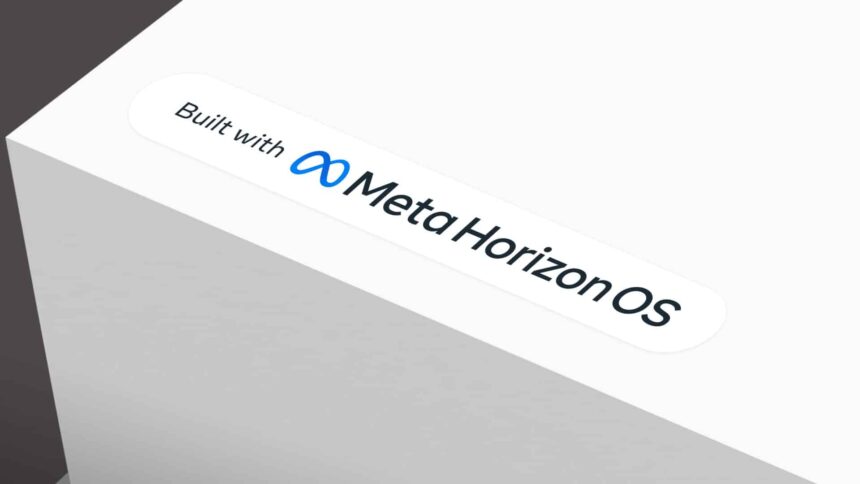- The operating system that powers Meta Quest devices will soon be available to other hardware makers like Lenovo, Asus, and Microsoft
- Meta revealed that it’s trying to create a more open ecosystem where consumers have more choices and developers have better resources to meet new users
- This open ecosystem might give Meta an edge over Apple which still follows its ‘closed model,’ limiting what users can do on its devices

On Monday, Meta announced that it has decided to make the company’s Meta Horizon operating system public, allowing third parties to use it to make newer and potentially better virtual reality headsets.
This operating system currently powers all Meta Quest devices, including the Meta Quest 3. Companies like Lenovo, Asus, and Microsoft have already decided to use this technology.
- Asus, being a global leader in gaming technology, will use this OS to build advanced gaming headsets.
- Lenovo will use its expertise to build mixed-reality devices that help with productivity, entertainment, and learning.
- Meanwhile, Meta itself has teamed up with Xbox once again to create Xbox-inspired limited-edition Meta Quest.
- Google has also been approached to bring its app store to Horizon-based headsets.
Meta Horizon is one of the company’s longest-running projects. With more than a decade’s worth of effort and research, the tech giant came up with a platform that mixes the core technologies behind mixed reality experiences with features that help with social presence (avatars, identities, social graphs).
The ultimate goal of the company was to create the best computing platform the world has ever seen.
- Meta started with technologies like inside-out-tracking and self-tracked controllers to power standalone headsets.
- Then it worked on hand, eye, and body tracking to create a more natural interaction system and a better social presence.
- Lastly, for mixed reality, Meta developed a bunch of new technologies, including high-resolution Passthrough, Spatial Anchors, and Scene Understanding to completely blend the digital world with the physical world.
These three main pieces of technology came together to form a full mixed reality operating system that’s now reshaping the industry.
In simple words, Meta Horizon makes it easy for developers to create and distribute their mixed reality experiences.
For starters, the company is working on a new spatial app framework that will help developers create mixed-reality products. They will also have the option to either create a new app from scratch or bring their existing apps to Meta Horizon.
Also, App Lab apps (App Lab is a storefront where developers can list their apps) will soon be listed under a dedicated section so that they can reach a larger audience.
Last, but not least, the Horizon OS is also equipped with content delivery and monetization tools, including the Meta Quest Store (soon to be renamed Meta Horizon Store) built into it, allowing developers to reach new audiences and profit from their hard work.
In its official blog, Meta says that it’s doing this to create a ‘more open ecosystem’ and make mixed reality available to more and more people. It will give developers access to a much larger range of tools and help device makers reach a wider audience.
However, there might be other reasons:
- Apple has already released a virtual reality headset called Vision Pro in January. In an Instagram video, CEO Mark Zuckerberg addressed that and said that Apple’s ‘closed model’ helped it win in the smartphone market. On a side note, though, Samsung just recently took over Apple as the #1 phone maker in the world.
- Zuckerberg further said that when it comes to PCs, people prefer an ‘open model’ that lets them customize their experience. And as for VR headsets, with Meta opening up the Horizon OS, people will have more options at different prices to choose from compared to Apple’s vertically integrated, expensive virtual reality headsets.
- Meta also has long-standing beef with Apple over its strict app store rules. So, by creating a Meta-controlled app store, it no longer has to deal with Apple’s high fees or wait for its approval on its apps.
- Another reason behind this move might be the losses incurred in Meta’s Reality Labs division. On a sale of $1 billion, the company incurred a loss of $4.65 billion. So, opening up its OS to third parties might help it become profitable.
The hardware companies involved with the new OS have already started working on developing new devices, but it will undoubtedly be a few years before any of them hit the market and is available to users.
Meta has been making some significant moves with open-source tools. For example, just a week ago it introduced Meta Llama 3, a next-generation open-source large language model.
The company claims it to be the most sophisticated open-source language model available right now and is planning to add it to AWS, Google Cloud, Hugging Face, Kaggle, and a few other platforms soon.
Llama 3 has already been integrated into Meta AI which is available on Facebook, Instagram, WhatsApp, and Messenger.
What makes it different is that it’s more powerful than other open-source AI such as Mistral 7B and Google’s Gemma 7B.
It’s also a lot better than Llama 2 in terms of reasoning capabilities, code generation, and the ability to follow instructions. And thanks to its 8B and 70B parameters, it can support multiple use cases, too.
Apart from Llama 3, Meta is also working on a bunch of other open-source projects.
- React is an open-source JavaScript library that can be used to build user interfaces.
- Then there’s Docusaurus that helps you maintain open-source website documentation.

